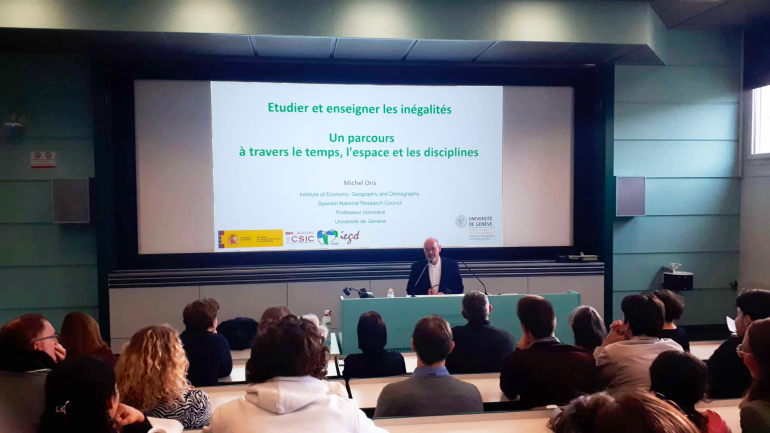
On 17 April 2024, Prof. Michel Oris gave his farewell lecture at the University of Geneva in front of a packed audience with more than 50 people standing. It was not actually a farewell to research for Michel Oris, as he is joining the Spanish Research Council in Madrid. The event was an opportunity for him to share anecdotes about the many 'fellow travellers' he has met during his research in Geneva, Europe and India in particular. It was also an opportunity for us to thank him for his contribution to the NCCR LIVES by obtaining funding for the NCCR in 2011 alongside Dario Spini and Laura Bernardi. On this subject, he points out that it would have been impossible to obtain LIVES without interdisciplinarity, and that the quest for this interdisciplinarity is not easy. It is very rewarding, while at the same time guaranteeing judgements on both sides. However, despite these difficulties, how can we respond to human vulnerabilities without bringing together different viewpoints? His answer: "it's because you're a bunch of nuts, because interdisciplinarity disciplines you".
In his introduction, Jean-Michel Bonvin listed the traces left by Prof. Oris. Oris: within the UNIGE, by creating a master's degree in socio-economics; within research, by publishing some 200 articles in fields ranging from social demography and the family to vulnerability and the life course; and with students, by inspiring them to become researchers and supervising a record number of master's theses and dissertations.
Among the many memorable phrases that Michel Oris included in his presentation ("Ceci n'est pas une page blanche", a reference to his Belgian nationality) or uttered during his lecture, we will remember this one: "To my students, you have made my life more beautiful. You have meaningful jobs.
We wish him all the best for the future!
*****
Three questions for Michel Oris
What is the greatest challenge in building bridges between disciplines and research teams, over so many years of research?
Of course, there are the egos and the competitive spirit. But the academic world produces this structurally, and a centre of excellence exacerbates these tendencies with annual visits from experts and 'publish or perish'. In this context, interdisciplinarity can be relatively superficial, borrowing from another discipline an idea, a concept or an approach that will appear original in its own discipline, without calling into question its habitus. This may be a good approach for doctoral students who, in the end, find themselves facing disciplinary juries. Beyond that, true interdisciplinarity requires time, a substantial cost of entry, and a real and lasting interest; and during all that time, we publish less... The solution - one solution... - undoubtedly lies in the collaboration of disciplinary teams around shared research questions, questions that call for the crossing, and sometimes the interpenetration, of viewpoints. From this point of view, vulnerability (vulnerabilities in the life course) has been a great idea.
As a specialist in inequalities, have you seen any changes in the way social inequalities are perceived by the public authorities and in public discourse?
Yes. When I was a teenager, Ettore Scola's film, "Affreux, sales et méchants", was a punch in the face, reminding us of the existence of shanty towns in rich Europe, and of the "fourth world". Then came the crises of the late 20th century, the "end of work", the era of the precariat, of working poors who, even though they work, cannot escape poverty. It was also a time of disaffiliation and exclusion. Vulnerability, a term that originated in the study of natural disasters to show that the damage they cause, both human and material, is not natural but social, economic and political, has only emerged in the political and scientific vocabulary in the last 25 years or so. It has spread and asserted itself spectacularly. But it seems to have declined in recent years. For the LIVES Centre, the life course and social inequalities will surely remain, but perhaps 'vulnerability' will be replaced. And I don't yet know what the other word will be, or what it will tell us about new perceptions of our insecurities and vulnerabilities.
On Wednesday 17 April you will be giving your farewell lecture at UNIGE. Is this really a farewell to research, or do you have other projects in the pipeline?
Since January this year, I've been a 'research professor' at the Spanish Council for Scientific Research in Madrid. I'm returning to something that is of no use, like everything that is essential to humanity, in this case historical demography. In these new fields of Spain and Madrid, and in particular the study of migrants and migration. Eventually, I'd like to work on a contemporary issue, the Spanish paradox: a country with one of the highest life expectancies in the world, and at the same time one of the highest prevalence of frailty among the elderly. That way, when I'm old and frail (and therefore frail and old), I might know where I stand...

